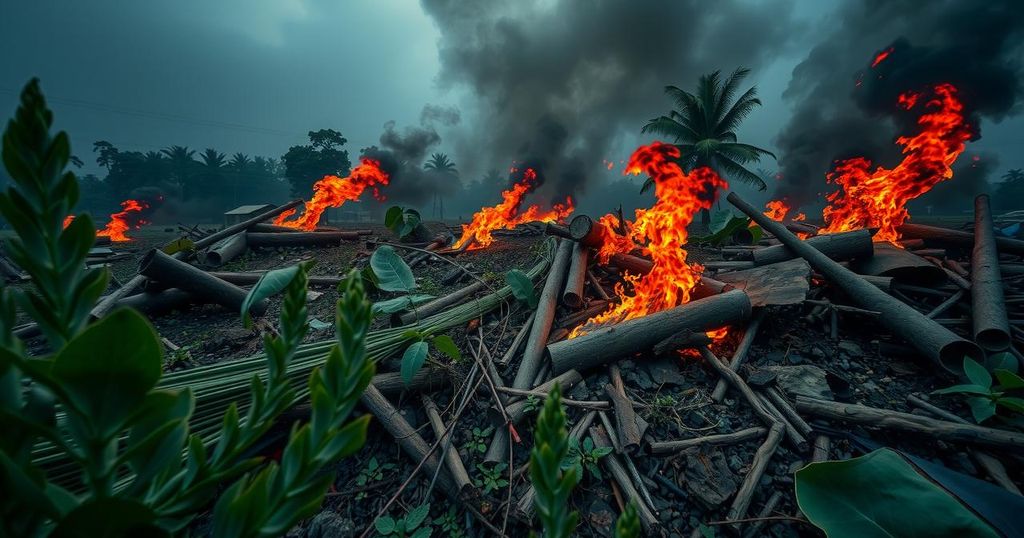Understanding the Conflict in the Democratic Republic of Congo
The Democratic Republic of Congo’s conflict arises from decades of ethnic tensions, political rivalries, and competition for valuable natural resources, rooted in its colonial heritage. Since its independence in 1960, the DRC has experienced ongoing violence, particularly in its eastern regions, with over one hundred active armed groups complicating the situation. Factors including poor governance, foreign interventions, and a legacy of impunity contribute to the crisis, resulting in a humanitarian disaster characterized by mass displacement and a lack of basic services. Ending the conflict requires justice, humanitarian support, and empowering civil society to lead reform initiatives.
The Democratic Republic of Congo (DRC), a nation with a tumultuous history, has been enmeshed in a cycle of conflict since its independence from Belgium in 1960. The root causes of ongoing violence are manifold, including ethnic tensions, political struggles, rampant corruption, and competition for control over the country’s rich natural resources. The current conflict, notably intense in the eastern regions bordering South Sudan, Uganda, and Rwanda, has persisted since the 1990s. A staggering presence of more than one hundred armed groups, primarily local militias formed to protect communities amid unrelenting instability, has contributed to this state of chaos. The factional loyalties are often dictated by ethnic identities and economic ambitions, deepening the complexities of the conflict. A breakdown of governance and ineffective management of state building post-colonization are substantial contributors to the turmoil. These difficulties are exacerbated by an enduring colonial legacy that imposed arbitrary borders and incited ethnic rivalries. Furthermore, the DRC’s wealth in minerals such as coltan and gold has attracted exploitation, as various factions vie for control over these resources, with some groups financially supported by their illicit trade. The legacy of Mobutu Sese Seko, whose regime from 1965 to 1997 was characterized by pervasive corruption and ineffective governance, has had long-lasting repercussions. The overthrow of his government did not stabilize the nation; instead, it allowed armed factions to proliferate in the power vacuum left behind. Compounding these issues, foreign interventions have complicated the DRC’s conflicts, particularly the involvement of neighboring countries in humanitarian crises and geopolitical struggles that culminated in the First and Second Congo Wars. Justice and accountability remain elusive within the DRC, as widespread impunity for human rights violations hampers the quest for peace. The ongoing cycle of violence is compounded by a lack of access to humanitarian assistance, exacerbating the suffering of millions. The historical context of the DRC reveals a legacy of violence that dates back to its exploitation under foreign colonial powers. The brutal enslavement and plundering of resources have left deep-seated grievances among the population, contributing to the current societal fractures that fuel conflict. The humanitarian implications of the ongoing violence are dire. With millions internally displaced, the human cost of the conflicts is staggering, with widespread reports of sexual violence, torture, and assaults on civilian populations. Even amidst significant mineral wealth, the DRC ranks among the poorest nations, with substantial numbers lacking access to basic necessities like healthcare and education. In order to place an end to these persistent conflicts, it is essential that justice is served, enabling victims to receive reparations and acknowledgment of their suffering. Moreover, humanitarian assistance must be expanded, and civil society empowered to advocate for their rights and effectively engage with governance issues. Justice, truth-telling, and reparations for conflict victims are paramount for rebuilding the DRC. A comprehensive approach that addresses historical grievances and provides support for socio-economic development, alongside mechanisms to hold perpetrators accountable, would be a viable path toward sustainable peace in the Democratic Republic of Congo.
The Democratic Republic of Congo (DRC) is a nation deeply affected by a legacy of post-colonial conflict, spurred by ethnic divisions, competition for resources, and systemic corruption. Since gaining independence from Belgium in 1960, the DRC has faced a multitude of challenges, including foreign interventions and civil strife that have devastated its socio-political landscape. The country’s rich natural resources serve as both a blessing and a curse, fueling ongoing violence as various factions vie for control over them. The armed conflict, characterized by armed groups and ongoing human rights violations, has resulted in millions of casualties and has created one of the largest humanitarian crises globally.
The Democratic Republic of Congo stands at a crossroads, where the interplay between historical injustices, resource exploitation, and ineffective governance continues to shape its persistent state of conflict. To engender lasting peace, it is vital to implement justice measures that acknowledge the grievances of victims and address the root causes of violence. Equally, strengthening humanitarian assistance and civil society empowerment is crucial to create a stable and just environment for all Congolese people. Only through such comprehensive efforts can the DRC hope to emerge from its troubled past and build a promising future.
Original Source: www.amnesty.org




Post Comment